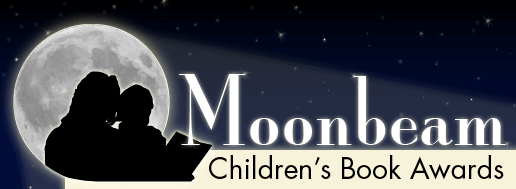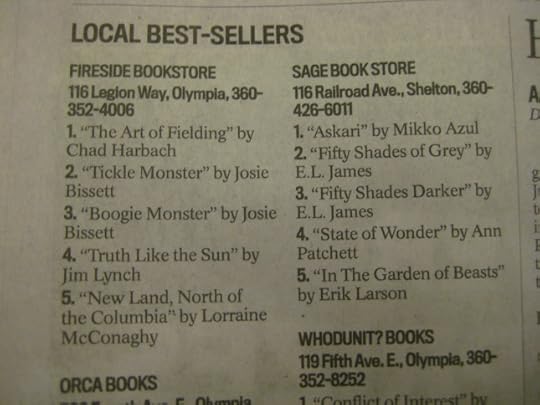Mikko Azul's Blog, page 2
October 6, 2012
Askari wins bronze medal at Moonbeam Children’s Book Awards
September 2, 2012
Guest Blog from Death Drop author Sean Allen
August 31, 2012 in The D-Evolution
As far back as I can remember I’ve always been one of those “I don’t care what you think about me” types. I did what I thought was cool and if folks didn’t like it, that was just too damn bad. Well, all that changed when I published Death Drop. Suddenly, I was reading critiques about my book from complete strangers, and I found myself on this weird emotional roller coaster that, as far as I was concerned, was not my style. Compliments about great action and well-developed characters had me grinning like a crazy person (and turning my wife into one of those bobble head dolls from continuous head shaking) one day, and quips about heavy-handed description had me slumping on the couch, eating buckets of chocolate ice cream and watching Lord of The Rings for the 600th time the next.
Why this sudden sensitivity to what others think? Because over the course of writing the book I became attached to the characters and their struggles. I’m not a parent, but I can imagine that publishing your first book and then hearing that it sucked is like sending your child off to school for the first time and then receiving a call from the principal saying that little Jonny is the spawn of satan and should never be allowed around other children. After a couple of consecutive low-rated reviews, instead of heading for Middle Earth via my remote, I Googled some of my favorite authors to see if I could glean some wisdom. It was kismet that led me to this little gem from one of the authors that I look up to most in the speculative fiction world.
“The main rule of writing is that if you do it with enough assurance and confidence, you’re allowed to do whatever you like. (That may be a rule for life as well as for writing. But it’s definitely true for writing.) So write your story as it needs to be written. Write it honestly, and tell it the best you can. I’m not sure there are any other rules. Not ones that matter.” —Neil Gaiman
I love this. It appeals to my rebellious side, while providing comfort against poor opinions of my work (which I know is bound to happen, but I don’t think I’ll ever reach a point where it doesn’t bother me at all). I found myself asking, “Did you write your story honestly, and did you tell it the best you could at the time you wrote it?” And my answers were and always will be a resounding “YES!” This quote now resides in the little notebook I carry with me for writing down any authorial epiphanies that come to mind, and I’m sure I’ll be referring to it many times over the years to come, not just for writing but for everything I endeavor to accomplish. I don’t think you can really go wrong with doing everything honestly and the best you can. It’s simple advice, and I find that more often than not, that’s the best kind. Thanks, Mr. Gaiman!
Cheers!
Sean


July 31, 2012
Askari is a local best-seller!
May 8, 2012
Verisimilitude and Escapism
My debut novel Askari has been out for nearly a month and the reviews are starting to trickle in. I am pleased to find that my book has been well-received by my readers, yet the inevitable questions are beginning to arise. Who are the inspirations for the characters? Do the places in Muralia really exist? And my personal favorite: Am I a devil-worshipper because I write fantasy? Really?
I write fantasy for the same reason that I read it – escapism. It is the same with all fiction, whether it’s fantasy, romance or mystery…readers want a sense of transportation into something or somewhere other than where they are. It’s fiction. However, it has to be believable fiction or it won’t capture the imagination of readers.
Verisimilitude is defined as having the appearance of truth. Characters have to be believable, situations have to appear as realistic as possible or they ring hollow and readers have to be able to see, smell and feel where the author has placed them or they’ll put the book down and rent a movie. However, there are dangers inherent to creating lifelike characters and situations…sometimes readers think that they’re actually real.
Like most authors, I am first an observer. I try to see everything and note what makes something interesting or memorable. People are wonderful because they have so many facets to their personalities. There are the physical characteristics that make individuals unique, then there are the quirks, turns of phrase, voice inflection and gestures that stick in my memories. To be immortalized in the written word can be a blessing or a curse and I wouldn’t be the first spiteful author to have taken such liberties with folks who have annoyed me or had a significant impact on my life.
I have to be honest, there are a few characters in Askari that are modeled after certain individuals. Cedron, my hero, is modeled after my oldest son Dale. Others who have made an impact on characters were a friend from my time as an exchange student in Germany, one of my Marine Corps drill instructors and an exceedingly annoying professor from college. Otherwise, characters have been created using images from magazines or loosely fashioned after people I’ve known or imagined with no conscious efforts at recreating anyone intentionally.
The land of Muralia, as far as the book has explored in this first novel, is very similar to the Pacific Northwest where I’ve lived most of my life. It’s beautiful here – mountains, streams, ocean, plains. We have it all and it makes for an impressive locale for any armchair adventure. My day hiking in the Ape Caves near Mount Saint Helens inspired one chapter significantly…coupled with my love of skiing and the idea that surfing and snowboarding should be as fun as they look.As a SCUBA diver, I’ve encountered amazing creatures in the deep that have made it into my writing.
Again, it’s all about creating a venue for escape that has the appearance of realism. Magic and mystery can transport us from the challenges or boredom of our everyday lives, but they have to appear plausible. Because I write fantasy, about magic and demons, does that make me a devil-worshipper? Sorry, it’s hard not to grin here. I have researched a lot of Wiccan tradition, satanic rituals and read a lot on paranormal activity, magic and mythologies in order to represent these things with verisimilitude. Despite the risk of offending my readers whose faith may be challenged by my work, please remember one thing: it’s fiction!
Philip Pullman’s The Golden Compass was a cautionary tale for me. In his trilogy, His Dark Materials, of which The Golden Compass was the first book, the heroes effectively kill God. This book had the appearance of a criticism of Christian theology…Catholicism in particular. The movie sparked a movement among the churches of our nation to boycott the film as a result of the theme. It was very important to me not to offend anyone in the creation of what I hoped would be pure reading enjoyment. I created deities from polytheistic traditions and creations myths from around the world so that they would ring authentic without appearing to challenge the validity of any one religion or faith. My personal beliefs have no bearing on or in my writing.
Dear readers, I am not a satanist or pagan nor do I feel the need to have my beliefs labeled. They aren’t relevant. Again, it’s fantasy…fiction…pure escapist enjoyment. Besides, I haven’t sacrificed a virgin in my back yard in years.


April 12, 2012
What’s It Worth To You?
From time to time, I ask other authors or those in the publishing industry to be guest bloggers; especially if they have something important to say. I recently asked my friend and fellow author Lisa Unger to share her experience and research on e-book pricing and how she manages to deal with the rising costs of publication. Here are her inspiring words:
What’s it worth to you?
In the controversy over e-book pricing, it might be important to recall that when you buy a book, the form it takes is the least important element of the purchase. You are buying a story, a work of art. It takes the author a year (or sometimes much longer) to create something that will transport, entertain, enlighten or educate you. It takes the publishing company a year to provide multiple edits, design, production, marketing, and author tours for each story. The actual binding and shipping of the book is a small part of the overall cost.
As readers, we are not buying physical books. We are not buying paper and binding and ink on a page. We are buying an experience. We want that. We want to be moved by prose, or entertained by plot. We want to fall in love with characters and root for them. We want to unravel a mystery, or involve ourselves in a love story, or learn something important about the world in which we live. This is worth something – in any format.
It’s easy to forget about the writer. We are the quiet ones. We are in our offices, typing away, spinning story webs – while the corporations and the government fight like titans over what our work is worth to whom, over who should be selling it, in what form and for how much. It’s easy for someone who has never written a novel to say it should be $12.99 or $9.99 or $.99. However, there’s nothing easy about writing a novel. Sure, it’s a labor of love, a tremendous gift and a blessing. But it’s also an enterprise that consumes us heart and soul. It’s an act of pure giving – to the page, to the reader.
I read because story has always enriched my life. Every time I open a book, I learn something. To me, that’s priceless. I can’t imagine a life with out books – either reading or writing them. I’m not sure it much matters whether story lives in cyberspace or on the printed page. But it pains me that in all this chatter about pricing, about independent booksellers vs. chains, Nook vs. Kindle, e-books vs. printed books that no one ever talks about story. About what it means to write and to read, the value that story has in our culture and in our individual lives. When did we forget about that?
I don’t have any strong feelings about what a book should cost. I know that people are struggling in this economy – and in any economy, really. When aren’t at least some people struggling? (PS – Writers are often among those people.) And I love the fact that libraries exist so that people can read, no matter what they have or don’t have. That’s important, because a story is nothing without a reader.
Independent bookstores, too, occupy an important place in our communities. And it’s sad that large corporations are muscling out small businesses that really care about what they’re doing. But unfortunately this is happening across industries. It has little to do with publishers or vendors. It has to do to with much bigger factors – we have less time, less money. We’re busy addicted. We can’t wait for Saturday to roll around, where we stroll out to get a coffee and stop in the local bookshop, see what’s new. We press a button to get what we want. It comes in the mail, or is delivered instantly to our devices. We want it now. We want it as cheaply as possible.
But it’s important to remember that not everyone can write a book. And fewer people still can write a good one. And that skill, if we still love story and still want it as part of our lives, is worth something. So, the next time you buy a book in any format, from any bookseller, remember that you’re not paying for the item in your cart, you’re paying for the experience of being told a story. Hopefully, it’s a good one that will occupy your attention and imagination for days or longer, and one which you’ll carry with you for a good long time. Remember to ask yourself: Why do you read? What is that experience worth to you?
For a really smart look at the subject of e-book pricing, read this terrific article at http://news.cnet.com/8301-1023_3-5741...











